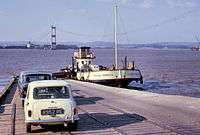
Aust Ferry
Aust Ferry or Beachley Ferry was a ferry service that operated across the River Severn between Aust and Beachley both in Gloucestershire, England. Before the Severn Bridge opened in 1966, it provided service for road traffic crossing between the West Country and South Wales. The nearest fixed crossing was a 60-mile (97 km) round trip to Gloucester.
The ferry ran from a pier at Old Passage near the village of Aust on the east bank of the Severn. It ran to a similar pier on the east of the Beachley peninsula. The car ferry, set up in 1926, only serviced cars, pedestrians and motorcycles; goods vehicles were prohibited from accessing the ferry terminal.
History
There has been a passage across the Severn at this location since Roman Britain. It has been recorded the site of the Trajectus (throwing-across) where the Roman legions used to be ferried across the Severn. It was recorded in the 12th century when the de Clares, lords of Tidenham, granted quittance of the passage to the monks of Tintern. It was evidently much used in 1405 when great numbers of the English and Welsh were said to resort to the nearby chapel of St. Twrog. The manor of Tidenham retained rights over the passage, and received rents from the parishes of Aust and Beachley, until the 19th century.

Aust
Coordinates: 51°35′57″N 2°37′04″W / 51.59911°N 2.61788°W / 51.59911; -2.61788
Aust is a small village in South Gloucestershire, England, about 10 miles (16 km) north of Bristol and about 28 miles (45 km) south west of Gloucester. It is located on the eastern side of the Severn estuary, close to the eastern end of the Severn Bridge, now part of the M48 motorway. The village has a chapel, a church and a public house. There is a large area of farmland on the river bank, which is sometimes flooded due to the high tidal range of the Severn. Aust Cliff, above the Severn, is located about 0.5 miles (0.80 km) from the village. The civil parish of Aust includes the villages of Elberton and Littleton-upon-Severn.
History
Overview
Aust, on the River Severn, was at one end of an ancient Roman road that let to Cirencester. Its name, Aust, may be one of the very few English place-names to be derived from the Latin Augusta.
The name of Aust is recorded in 793 or 794 as Austan (terram aet Austan v manentes) when it was returned to the Church of Worcester after having been taken by King Offa's earl, Bynna. In Domesday, Aust Cliff was recorded as Austreclive, "clive" being a Middle English spelling of cliff. and the estate was held by Turstin FitzRolf in 1066. In 1368 the area was called Augst, "the short unmistakable form of Augusta.
AUST
AUST or Aust may refer to
Abbreviations
People
Places
in England
in Norway
See also
Aust (surname)
Aust is a surname. Notable people with the surname include:
Podcasts:

